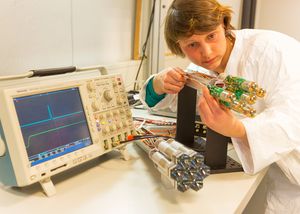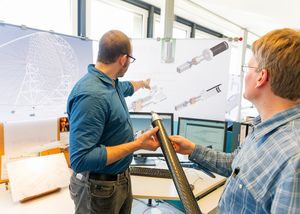Electronics
The Electronics Division is involved in nearly all scientific experiments carried out by the Max Planck Institute for Physics. New research projects often begin with an idea for a novel measurement system to detect physical quantities - for example high-energy gamma radiation which arrives here from space, or decays of elementary particles.
The practical implementation is the task of the approx. 25 electronics experts at the MPP. Most of the instruments for physics experiments are so specialized that the necessary hardware is not commercially available. The particular challenge facing the Electronics Division is to develop and construct many of the high-tech components themselves - including the simulation, design and layout of analog and digital circuits.
Specialized groups
The specialist Electronics Division is divided up into three groups. Each of these groups has special tools for efficient, highly-specialized workflows in order to do justice to the scientific challenges.
Mechanics
The specialist Mechanics Division develops, manufactures and tests the mechanical components for experimental setups and installations. Thirty highly qualified engineers, technicians and mechanical specialists work in close cooperation with the scientists and the specialist Electronics Division.
The enormous range of tasks is often at the limit of what is technically feasible: the dimensions range from precision mechanics on the micrometer scale through to the construction of large installations. What’s more, the components must be installed in high mountain ranges or deep below ground. Just as extensive is the range of technologies and materials. The staff at the Institute uses a wide variety of metals, synthetic and special materials, which sometimes have to withstand extreme conditions.
The tasks in detail:
- Development, design and numerical analysis of complex components and assemblies using state-of-the-art CAD and FEM software.
- Operation of 5-axis and CNC machine tools, water-jet cutters, 3D printers
- Use of mobile and stationary high-precision measuring equipment
- Manufacture, installation, testing and servicing of highly complex detector modules, sometimes under cleanroom conditions and at external locations
- Quality control, documentation
Information Technology (IT) Service
It is inconceivable that research in elementary particle physics can be undertaken without IT. IT systems play an important role in both experimental and theoretical physics. When evaluating particle decays, for example, large amounts of data have to be recorded, and it must be possible to reliably distinguish relevant data from disturbing signals.
Particle physicists incorporate a great many variables and dependences when computing or checking new theoretical models - and these also have special IT requirements.
The task for the IT experts at the MPP is to facilitate the flexible adaptation of the IT infrastructure to scientific approaches, i.e. the network, computer architecture, operating systems and applications. The tasks also include further classic services such as Web services and user administration.


